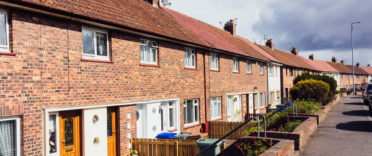As a nation obsessed with property, predicting house price trends is a national sport. With a house representing most home owners' biggest investment keeping track of how its value is likely to fluctuate is important, particularly if there is a risk you could lose money or end up in negative equity.
In 2020, the UK property market has been in an interesting state of flux, with a combination of dire economic conditions brought about by the Covid-19 pandemic, alongside a burgeoning property market and rising house prices. The question is: are we now due a sharp correction in house prices?
This was a question covered in our event "Property in a Pandemic: Is now the time to move?".
What has driven house prices in 2020?
The year started with a continuation of the steady upward trend in house prices and the number of property sales we'd witnessed in 2019. However, growing danger of the pandemic served to slow the market from the beginning of March, with everything then grinding to a halt when the national lockdown was implemented on 23 March.
Over the lockdown period from March to June, there were 246,000 housing transactions in the UK, a fall of almost 150,000 on the predicted figure of around 394,000 we would have expected to see without Covid-19. However, even during the time of strict restrictions, property portals Rightmove and Zoopla reported record numbers of people accessing their sites, perhaps fuelled by dissatisfaction with their own properties or a new importance placed on factors such as access to outside space or room to work from home.
When the market began to open up again in June, it experienced a dramatic resurgence, driven by three key factors:
- Pent-up demand: the 150,000 people who had been planning to move in the first half of the year began to flood the market once estate agents were able to operate normally and there was scope to list properties and arrange viewings
- Stamp duty holiday: the announcement by Chancellor Rishi Sunak of a period of relief from paying stamp duty tax on the first £500,000 of a property's value gave the market an immediate shot in the arm. This scheme lasts until 31 March 2021
- Covid support schemes: further financial measures, such as the furlough scheme, supported the economy and helped shore up consumer confidence
What is happening to house prices now?
The general picture of the UK housing market at the moment is of increased activity and a corresponding uptick in prices. This is supported by evidence from a number of national house price indices, which provide an insight into what is happening in the market.
HMRC UK House Price index
The government house price index is based on information from Land Registry and has a two-month lag. It shows that, as of the end of August, property prices had risen by 0.7% compared to July and 2.5% compared to the previous year.
Nationwide House Price index
Based on mortgage lending, the most recent data shows annual house price growth of 5% in September, the highest rate since September 2016. There was an increase of 0.9% on the previous month, taking into account seasonal variations.
Halifax House Price index
Also based on mortgage lending figures, the Halifax House Price index results were more positive than the Nationwide findings, with house prices 1.6% higher in September than they were in August and 7.3% higher than for the same month last year.
Rightmove House Price index
This index is based on average asking prices and demonstrated a national record in September, with a 1.1% monthly rise. Prices are now 5.5% higher than a year ago. In addition, the average time to sell fell to 50 days, the fastest time on record, while the number of sales agreed in a month was up 70% compared with September 2019.
Are we going to see a correction in house prices?
Commentators tend to agree that, even if we don't experience a sharp market correction, it is very likely that the period of record-breaking growth and vitality in the housing market is going to come to an end. This will be influenced by:
- The pent-up demand from earlier in the year working its way through the system
- The end of the stamp-duty holiday, with potential movers being warned they need to act fast to stand a chance of completing their transaction before the March 2021 deadline. For more information on this, read our article "How to move house quickly: 5 ways to beat the stamp duty holiday deadline"
- Other government support, such as the furlough scheme and the mortgage and loan payment holidays, coming to an end
Indeed, the Centre for Economics and Business Research (CEBR) anticipates a fall of 14% in house prices in 2021.
How can you protect yourself from a house price correction?
- Don't move: Changes to house prices are often only really relevant when you come to sell. For most people who have owned their homes for two to three years or longer, the equity that has built up in the property during that time will insulate them from any downturn. If you are able to stay in the property during any downturn, while continuing to repay your mortgage, you shouldn't be affected.
- Don't overpay: If you are looking to move and are motivated by the stamp-duty holiday, don't be tempted to overpay to secure your new property. This could lead to you falling into negative equity- where your mortgage debt is higher than the value of your property - if the correction in prices is severe and you have a high loan-to-value mortgage. At the very least, consider if you are likely to be in the property for a decent period of time, over which period you could ride out any market fluctuations.
- Do your research: If you are planning to move, consider how the properties in the area you are moving to have fared during earlier periods of falling house prices. Some areas are better protected than others and this could be worth keeping in mind. This type of information can be found on the Land Registry website





